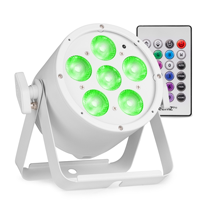Nightclub Lights
Lighting defines the energy and emotion of every nightclub. Whether it's a timed colour change during a beat drop or the gradual fade marking closing time, well-executed nightclub lights are key to curating atmosphere. Today's lighting systems, driven by digital control and efficient fixtures, give venues unprecedented creative flexibility. Design choices made before doors open impact not just the look of the space, but how people move, interact and remember the night.
Behind every lighting experience lies planning. From layout sketches to timing cues, each club sets unique objectives. Whether it's an intimate lounge or a multi-level destination venue, the right choice and placement of lights shape crowd response, define brand identity and drive return visits.
Nightclub Lighting Design Strategy
Successful nightclub lighting design begins by asking why different zones demand tailored light, when scenes should shift throughout the night, and how fixtures will survive the demands of heat, vibration, and heavy usage. Lounge zones need softer glows than main dance areas. Lighting must evolve with music peaks and crowd behaviour, and the equipment must remain durable and dependable. Addressing these factors early avoids retrofitting and empowers lighting operators to adapt in real-time to DJs or live acts.
Night Club Lights and Fixture Selection
A nightclub's lighting rig is typically built from a combination of fixture types. Motorised beam units provide rapid movement and tight shafts of light to cut through air with precision. Wash lights offer wide, soft coverage that can flood a room in colour or tone down intensity when needed. Pixel batons, made of individually controllable LED segments, add dynamic animation across trusses and backdrops. Flash and pulse units create dramatic, single-beat bursts synced to music. Ultraviolet sources briefly highlight fluorescent materials for added visual impact, while classic mirror-based effects lend retro charm and shifting texture. Each serves a distinct role, and combining them brings dimension and depth to the room.
Planning a Nightclub Lighting Rig
Planning for night club lights requires thoughtful alignment with venue layout. Overhead beams target the dancefloor centre, while side lights help prevent shadows on faces along the perimeter. Lighting near bars must be bright enough for visibility without overpowering the atmosphere. Cable management should prioritise safety, avoiding walkways while allowing quick access for servicing. Fixtures near lounges or VIP sections should use silent cooling systems to preserve audio clarity. Redundant power and data lines are essential, ensuring the show continues even if a component fails mid-set.
Controlling Nightclub Lighting Effects
Controlling the rig involves layered programming. Static base looks cover entry, breaks, or emergency needs. Pre-recorded dynamic sequences match musical genres or specific promotions. Signature moments are crafted with custom cues tied to key tracks. Lastly, manual override channels allow operators to react spontaneously to crowd energy. While festivals often rely on pre-programmed, time-coded shows, clubs thrive on improvisation. Intuitive desk layouts and clearly labelled controls reduce the chance of missed transitions when the music shifts unexpectedly.
Nightclub Lighting Effects Trends
Modern nightclub lighting effects follow evolving trends. Pixel mapping now extends visual content from LED walls onto lighting fixtures for immersive, unified displays. Slimmer, low-profile units preserve sight lines, especially important in an age of near-constant phone photography. Wireless control systems simplify multi-promoter setups, speeding up transitions between nights. Hybrid fixtures capable of beam, spot and wash functions save space in storage and broaden design options. Environmental sensors built into fixtures offer real-time feedback on heat, triggering safety features such as dimming to protect sensitive electronics.
Choosing Nightclub Lighting Equipment
Relying on nightclub lighting equipment purpose-built for entertainment venues ensures reliability and safety. These fixtures are designed to endure high humidity, physical vibration and extended use. Using professional-grade gear also simplifies insurance and compliance, with tested load ratings and ingress protection. In addition, such equipment offers consistent colour performance across long hours of use, lowers heat output for more manageable HVAC loads, and provides manufacturer support including firmware updates and modular repair options that minimise downtime.
Energy Considerations for Nightclub Lighting
LED-based lighting significantly reduces power consumption when compared to traditional discharge lamps. This not only allows for bigger systems without requiring electrical upgrades, but also eases the load on climate control. Reduced heat output translates to lower air conditioning costs, particularly important in older clubs with less efficient HVAC infrastructure.
Designing with Light for Atmosphere
A well-paced visual journey improves the clubbing experience. Softer tones often open the night, encouraging conversation. As crowds swell, saturation and movement intensity increase. By peak hours, lights sync tightly with sound for maximum impact. Toward closing, the pace slows again to signal last calls. Using venue architecture like arches and columns as lighting canvases adds texture and photogenic charm, creating impressive scenes without extra investment in decor.






